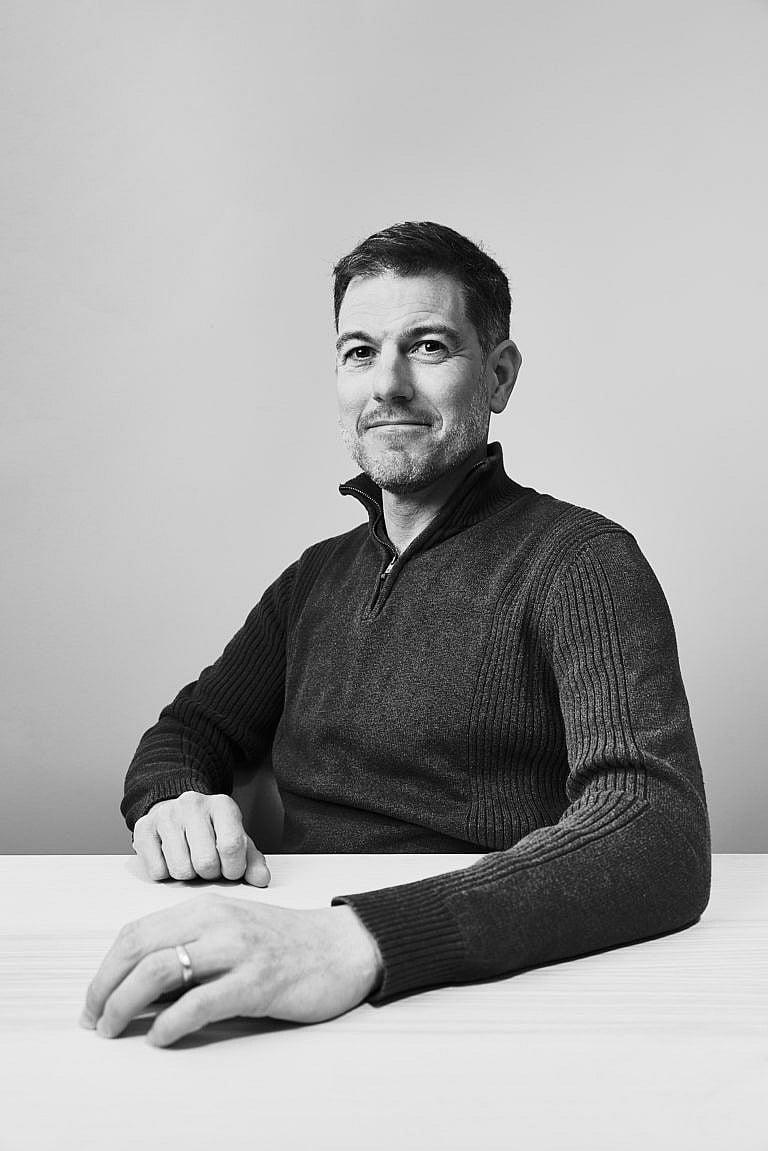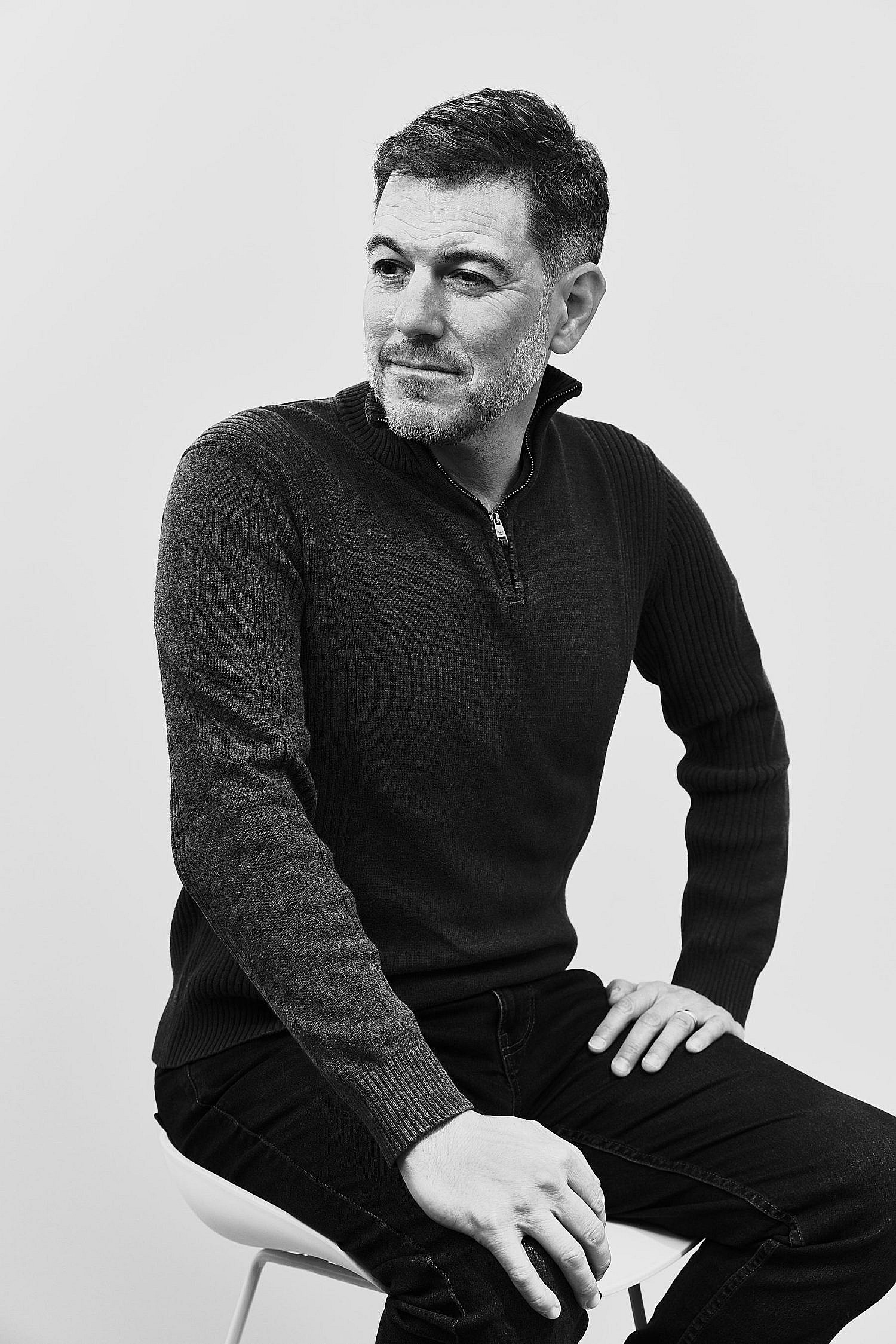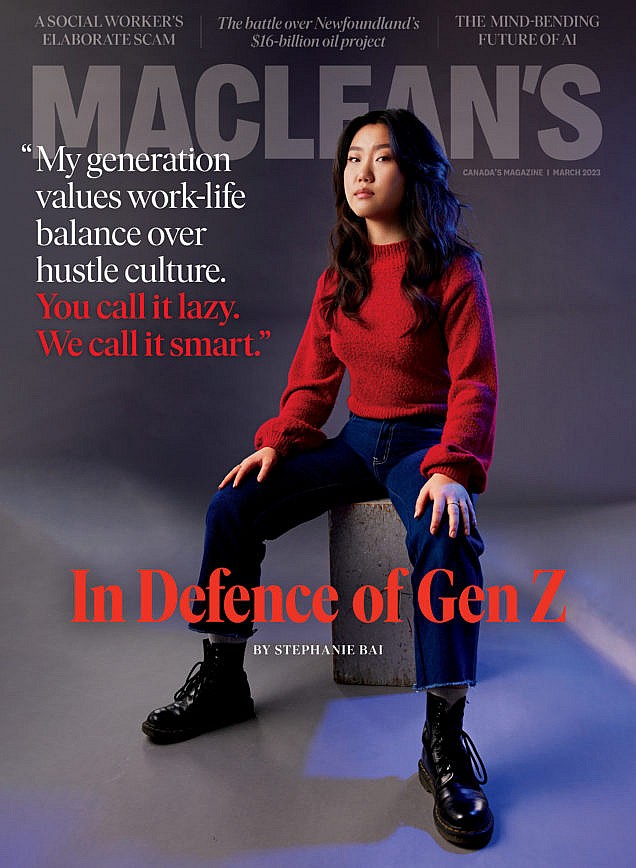Tech leader Martin Kon wants you to give AI chatbots a chance
“Technology will never replace human interaction. It’s about how to make mundane tasks more efficient, so we can focus on higher-value ones.”

“I don’t think technology will ever replace human interaction,” says Martin Kon. “It’s about how to make mundane tasks more efficient, so we can focus on higher-value ones.” (Photography by Daniel Ehrenworth)
Share
The robots are coming. Well, technically, they’re already here, but Martin Kon just arrived. Fresh off a stint as YouTube’s chief financial officer—where he and his team launched the platform’s TikTok-esque video Shorts—the Ontario-bred tech exec hopped back over the border and became president and COO of the mega-successful three-year-old AI startup Cohere, based in Toronto. Its mandate? Commercializing better human-computer conversations. Basically, they want a word.
Cohere’s recent US$125-million funding boost, and Kon’s pivot, coincides with the recent popularization of natural-language processing, or NLP, the branch of AI that’s teaching computers to digest and produce speech and text with the sophistication of human beings. As everyday websurfers use NLP-based tools like ChatGPT to produce A-plus college essays, the founders of Cohere are hoping to revolutionize the way the world does business. I spoke with Kon about all things AI during his first week back in Toronto. He had just finished setting up his new work computer.
I’m excited to talk to you about the ins and outs of AI.
Sorry I’m late. I had to download Zoom and Rosetta and install certain things. I now have a Mac, which I’m not used to.
This is a funny way into the subject matter.
I was going to say: I think I just disqualified myself as a tech expert.
You’re back in Silicon Valley North after a few years in Silicon Valley proper. How does it feel?
I found it really exciting to be in the middle of things. I think it’s clear that the San Francisco Bay Area will remain the driver of pure tech innovation around the world, but what I realized in getting to know Cohere is that Toronto is a legitimate tech hub, too. It certainly wasn’t 25 years ago when I moved away. I know of many Canadians like me who left the country. Now, we’re returning.
How does industry culture there compare to what we’ve got going on in Toronto?
Well, times are a bit different now. Silicon Valley firms used to have massive events and product launches because they had all this venture-capital money pouring in. It was like they could do no wrong. You see less of that in 2023. Now, they’re cutting staff and have a fifth of the money. I still tend to wear hoodies quite a bit, though.
Before Cohere, you were at YouTube, which will no doubt be booming for the foreseeable future. What inspired you to jump ship?
I mulled over that decision for six to eight months. In my last job, I reported to Ruth Porat and Susan Wojcicki, two of the most powerful women in the world—pretty amazing for a girl-dad. (I have two daughters.) Similar to how YouTube has been a disruptor for video and music, Cohere and natural-language processing are disrupting how we communicate.
In what way?
You’ve probably seen all those unicorns flying through waterfalls—or whatever Dall-E 2 creates—but much of the data we generate is in the form of language. We’re figuring out how to apply NLP to real business problems. It’s an enormous opportunity, and it’s happening in the province where I grew up. Two of Cohere’s three co-founders were also once at Google.
In tech, all roads lead to Google, it seems. How will NLP show up in the lives of everyday Canadians?
The possibilities are endless. NLP is going to give computers the ability to understand text and spoken words in the same way that humans can. Marketing teams and retailers can use it to generate first drafts of blog posts or online product descriptions. It can synthesize huge amounts of information to help summarize news reports, legal documents, video calls and customer-support inquiries. It stands to benefit masses of professionals—news publishers, financial institutions, even tax authorities.

There have already been a few attempts to have robots co-write articles for news outlets like the Guardian and the Globe and Mail. What about my job, Martin?
I don’t think you have anything to worry about. Quality journalism is about a lot more than just writing a first draft of words.
Ideally, yes.
The goal is to reduce the lower-level aspects, so humans can focus on the high-level stuff, like structuring narratives and refining arguments. Google Sheets and Microsoft Word didn’t put writers or bankers out of work. It allowed them to do things they never could have dreamed of in the days of calculators or abacuses or, you know, quill pens.
God, I’d love to write with a quill pen.
You can do that for fun.
Okay, well, that was reassuring. What makes Canada a particularly fertile market for an AI boom? We’re often worried about a brain drain.
Toronto has taken a leadership role in some of the emerging machine-learning and AI technologies. A lot of them are coming through the University of Toronto and computer scientist Geoffrey Hinton, who is the go-to AI luminary. Some of the political developments in the U.S. and the U.K. within the last few years have also probably helped people see Canada as an attractive place to be.
That said, this country can get a little gun-shy when it comes to innovation. Take legislation like the proposed Bill C-27, which includes Canada’s Artificial Intelligence and Data Act—some think regulation might frighten founders.
AI is new territory. It certainly needs to have reasonable guardrails, but it’s important for Canadian lawmakers to reflect on the huge economic and societal value that the technology has for Canada. The danger is that, you know, I’ve become American myself. I could just jump over the border. Companies could easily swap their subsidiary to the parent and become an American company. That would be a real shame.
As we saw with crypto, technology often moves faster than governments can regulate it. What needs to be done so that the world of NLP doesn’t become the same kind of free-for-all?
Personally, I see NLP and crypto as completely different. There are some interesting applications for blockchain, but that explosion of hype—where anyone who launched a company and said “NFT” got millions of dollars? I always thought, Why?
Not so with NLP?
With NLP, the applications are clear. Yes, things move very, very quickly. Cohere’s co-founders helped put together a groundbreaking best-practices commitment with OpenAI and AI21 Labs, which are our competitors. They wanted to stand behind guidelines that had precautions around harm mitigation.
I’m guessing that, being in tech, you’re probably not super risk-averse.
I worked in consulting for 23 years. That’s the definition of risk-averse.
So the AI stuff is a pivot, then! When you think about what Cohere is on the verge of creating, does that combination of innovation and speed ever scare you?
Aiden Gomez, one of our founders, co-wrote the paper that introduced transformer technology—the “T” in ChatGPT—just five years ago. ChatGPT itself only launched last fall, and now everyone can play with it. That speed doesn’t scare me when you have the right people with the right values thinking about it—and, sometimes, losing sleep over it.
Are you describing Cohere’s co-founders?
They’re good people who want to do the right thing, not because the government tells them to or because a certain move would be bad PR. I hope that governments seek out those kinds of people and say, “Can you help us to think about this gnarly, complicated, tough new thing?”
I’m sure Canadians will appreciate your emphasis on ethics given the existing stereotype of tech leaders—the obsessions with shiny new toys, the god complexes, et cetera.
Some are like that. But I wouldn’t want to work for a company whose CEO wasn’t a good human being, or someone who was just about shiny objects and maximizing profits. I think when you do the right thing for the world, most of the time, the profits follow.
Are there any aspects of your life that are surprisingly analog?
I’m not on Twitter. I haven’t seen that it enhances careers. My handwriting is appalling, but I take notes with a pen. (I almost never read them, but it’s proven that the act of writing helps with memory recollection.) My first job was at Bosch, which is the biggest car-parts manufacturer in the world. I like old cars, and I’ve always loved machines; it’s big tech in a different way. My Porsche 911 Turbo, which I had a poster of on my dorm-room wall, doesn’t even have power steering.
Were you ever an art guy in school?
I was interested in music. My wife’s a wonderful painter, though. My mother’s doing a lot of painting, too.
Siri and Alexa are household names at this point, but in the last few months, people have been furiously uploading their selfies to Lensa and generating wacky pictures with Dall-E 2. What do you make of it all? More importantly, Martin, what would your mom think?
Hopefully, she’d find it amusing and send me pictures of dogs in sushi houses or whatever we’re seeing online. But again, if we’re talking an NFT versus a Van Gogh, you can see the texture is different in a digital image—even if there’s only one in the world. I think there could be interesting applications for text-to-image technology in advertising and content creation, but I’m most excited about language. The pictures of cows flying over a snow-covered mountain in Greenland? That’s just fun.
AI used to live, more or less, in the domain of data. With advances in NLP, it’s moving into creative and relational tasks—things that are more distinctly human. I definitely want a robot in charge of getting me out of parking tickets; I’m a bit more reluctant to disclose my childhood trauma to one. What’s your stance?
That’s not easy to answer, by any means. I’m sure you have a banking relationship, right? I don’t know the last time I called my bank and thought: Oh my goodness, how horrible! The teller’s been replaced by a robot! I think: I’ll use their fantastic app! I can see my balance, I can get alerts. I don’t think twice about the fact that it’s not a human doing it for me. I just want the answer to my problem.
But the personal stuff—
Talking to a therapist about a child who’s misbehaving? That’s a situation where you’d want to talk with someone directly. I don’t think technology will ever replace human interaction. It’s about how to make mundane tasks more efficient so we can focus on higher-value ones.
So what do you think we’ll do with all that free time, without all that unnecessary drudgery?
Well, we now have more free time than we did 30, 40 or 50 years ago because we have dishwashers, remote controls and Uber—inventions that save us from having to do everything ourselves. Hopefully we’ll have more time to interact with each other and enjoy life. We’ll all just do what we do better.
What do you like to do with your free time?
My wife and I have an eight-year-old and a six-year-old, so I guess you could call that free time. A lot of it is spent with them, which is a joy. The kids both do Irish dance and gymnastics and play tennis. I also enjoy driving my Porsche on winding roads.
See! Not so risk-averse.
Not if you’re a safe driver. If you have a 911, you have to know what you’re doing. It’s called “the Widowmaker.”
If, at the end of 2023, you asked a Cohere-created chatbot to explain what your year involved, what would you want it to say?
That Canada is the home of the Stanley Cup champions for the first time since 1993. Also, that we continue to cement our position as a world leader in the realm of AI. We have a few months to see if that’s the reality.
That sounds more plausible than a Stanley Cup, honestly.
I’m not sure that we can engineer it, but that would be a nice thing.
This article appears in print in the March 2023 issue of Maclean’s magazine. Buy the issue for $8.99 or better yet, subscribe to the monthly print magazine for just $29.99.
